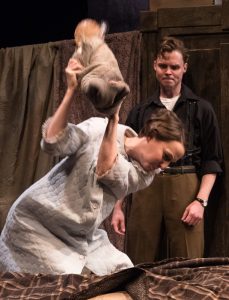Shelagh Delaney was only 18 when her first play, A Taste of Honey, premiered in London in 1958 and she added to the gender diversity of the Angry Young Men of postwar British theater. The play was developed at the acclaimed producer Joan Littlewood’s Theatre Workshop, and it contains some of Littlewood’s hallmarks, notably a jazz trio playing standards that evokes the British music hall (a popular influence in British theater, used by John Osborne as the setting for The Entertainer and by Littlewood herself in Oh, What a Lovely War!—and on through Privates on Parade, right up to One Man, Two Guv’nors in 2011).

As with Osborne, Arnold Wesker, and John Arden, the focus of the “angry theater” was the travails of the working-class English. Delaney’s play is set in Manchester, and concerns Jo, who is 17 and lives with her mother, Helen (Rachel Botchan), a sometime prostitute. For the late 1950s, and for an author of 18, A Taste of Honey is astonishingly frank and casual about taboo topics of the period. Jo refers diffidently to Helen’s “immoral earnings.” Jo herself has an affair with a black sailor (Ade Otukoya) and becomes pregnant by him. She sets up house with a fellow art student, Geoffrey (John Evans Reese), who is gay and has more nurturing instincts toward her than Helen does.
Jo’s fractious relationship with her mother is, in Delaney’s play, the fault of both characters. Rebekah Brockman’s Jo is irritatingly immature and impractical, yet self-confident, and she and Helen squabble frequently. Helen has clearly not taken a strong hand in raising her daughter, and Jo is a free spirit as a result, mouthing off in a way that the vast majority of middle-class 1950s teenagers probably wouldn’t dare to.
Meanwhile, the narcissistic Helen blows hot and cold about caring for her daughter. “Why don’t you learn from my mistakes?” she asks Jo solicitously at one point. “It takes half a life to learn from your own.” Yet she’s also capable of saying, “I never have thought about you when I’ve been happy.” It’s a measure of Delaney’s maturity that she can create characters so complex and show the struggles of their lives so vividly.
The play focuses on Jo’s coming of age. Helen has a roistering time with a former client/boyfriend named Smith (Bradford Cover, with an eyepatch), who has tracked her to their new digs. Joe resents Smith and spars with him verbally, even though he makes overtures to be kind to her. (In The Angry Theatre, John Russell Taylor, who saw Delaney’s original script, says Smith’s kindness was toned down in Littlewood’s final version.) Eventually Helen runs off with him, only returning after Smith has run off with a younger woman. Meanwhile, Jo and Geoff have established a home of a sort—Jo works in a shoe shop by day and a bar at night. But Botchan’s selfish, blundering Helen, now displaced, ousts Evans’s gentle, patient Geoff in the awkward, melancholy climax.
The play is a dream play, with flights of fancy and high theatricality in spite of its working-class milieu—Jo talks about the sailor being “an African prince,” and Geoffrey yearns to be a father figure in a heterosexual family and fit in. Characters deliver asides to the audience in the manner of Restoration comedy. Director Austin Pendleton uses the jazz trio not only to punctuate verses of songs that the characters break into, and to cover scene changes, but also as a silent chorus. When Helen shows them racy advertisements, Max Boiko (trumpet), Walter Stinson (bass), and Phil Faconti (guitar) play along and take a look with wry reactions; two of them often share the sofa with the speaking characters. (Harry Feiner’s scenic design delivers a heavier dose of realism, with its drab browns, duns and mustards, visually enlivened only by Barbara A. Bell’s bright dresses for Helen.)
Still, there’s a sense that, even with its open artifice, Delaney’s characters were lifted out of a vacuum and placed in this setting. As a dream play, it’s not as easy to adjust to or as persuasive as, say, The Glass Menagerie. Delaney never had a bigger success than A Taste of Honey, and it’s rarely revived nowadays. It has perhaps frayed a bit at the edges, but it’s still a work that continually surprises with its modern feel. The Pearl Theatre’s season opener is a welcome opportunity to see it.
The Pearl Theatre's production of A Taste of Honey will play through Oct. 30 at 555 W. 42nd St. Performances are at 7 p.m. on Sept. 20, 22, Oct. 3, 4, 10, 12, 13, 16, 20 and 24; at 8 p.m. Sept. 23, 24, Oct. 21, 22, and 29; and at 2 p.m. Oct. 2, 22, 23, and 30. Tickets are $59 and may be purchased by calling the theater at (212) 563-9261 or visiting pearltheatre.org.







